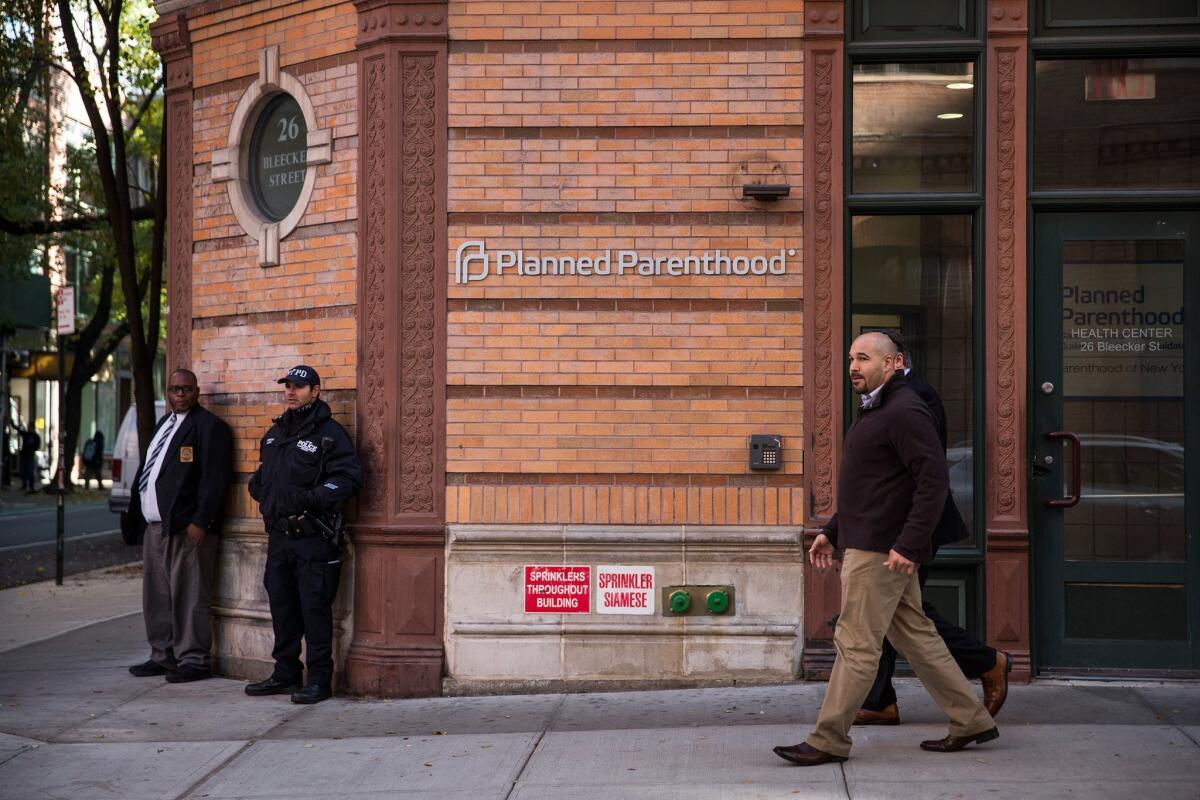Op-Ed: Violence, intimidation and hate: What it’s like working under siege at Planned Parenthood

A police officer from NYPD’s counterterrorism department stands guard outside a Planned Parenthood clinic in New York City on Nov. 30.
- Share via
When I first heard it, I thought it was a joke: Bank robber takes refuge in a reproductive health clinic. Not a funny joke, but a cruel one. As a former Planned Parenthood employee, I knew the early reports would prove false. I knew the Colorado Springs clinic was under attack.
For several years in the 1990s, I worked at a small Planned Parenthood clinic in Kansas. I started as a secretary, became a community sexuality educator and, along the way, helped with the mundane tasks of keeping a health center open. I answered phones, opened mail, stocked supply rooms and filed records.
The intimidation came in cycles. Periods of relative quiet would give way to increases in threatening voice mails and then erupt into a solitary act of destruction.
The office was in a low-income neighborhood and offered low-cost or free services on a sliding scale. We focused on basic healthcare as does any doctor’s office, including wellness exams, pregnancy tests, birth control, testing and treatment for sexually transmitted diseases, and the administering of flu shots. We didn’t offer abortion services, but we were still engaged in an essentially radical act: providing nonjudgmental care, regardless of whether a client could afford to pay. Our clients were primarily poor, people of color, people from the LGBT community, and other underserved populations.
An unaffiliated clinic in town offered abortions, and it received the brunt of the protests, hostility and aggression. The director of that clinic, Dr. George Tiller, was shot in 1993 and murdered in 2009.
Despite our seemingly safe remove from the abortion wars, my Planned Parenthood office operated under a steady trickle of verbal abuse. When we listened to voice mails left overnight, mixed in with patient calls were messages from our detractors. Some were as benign as scriptural quotations, while others promised hellfire and damnation. The worst messages were those that contained specific threats of violence. Planned Parenthood’s commitment to the safety of its staff and clients meant notifying the police.
Our tormentors weren’t always satisfied with phone calls. On more than one occasion they poured butyric acid under the clinic doors and into the ventilation systems, forcing patients to reschedule appointments. For low-income people taking unpaid time off work for medical appointments, it was one more obstacle to receiving care. When a clinic closes, for a day or forever, those are the people who are disproportionately affected.
One day, someone put gasoline under the back door and ignited it. The small blaze burned out before firefighters arrived, but they gave us a quick lesson in fire-extinguishing for the next time. We were always worried about the next time, and we were right to worry. Several months later, someone — maybe the same someone — tried again to start a fire.
On a regular basis, we replaced windows broken or damaged by someone taking potshots at the clinic after hours. We swept up glass while protesters heckled us. Twice we came to work to find that someone had lighted a homemade cherry bomb on our doorstep. Not the sort of thing designed to injure people but to cause property damage and scare clients. We cleaned up and improved security. We were always improving security.
These incidents didn’t make the news. The police considered them minor acts of vandalism, on par with a broken window at a hardware store, or an M-80 in a restaurant dumpster. The glaring distinction being that hardware stores and restaurants weren’t caught in the middle of a national argument about reproductive freedom.
The intimidation came in cycles. Periods of relative quiet would give way to increases in threatening voice mails and then erupt into a solitary act of destruction. A broken window, a singed door, the sudden stench of rot and vomit from butyric acid creeping into the health center. Even if they weren’t coordinating with one another, the individuals who terrorized our center seemed to respond to anti-choice messaging. When public figures such as Pat Robertson denounced Planned Parenthood, the phone calls increased.
It seems strange to talk about this so long after it happened, except that 15 years later, there’s still hostility toward Planned Parenthood and other reproductive health centers. Manufactured outrages — such as the videos purporting to show fetal parts for sale — feed extremist rhetoric.
The Internet provides plenty of platforms for abusive comments and outright threats, and our 24-hour news cycle is full of toxic messaging.
Donald Trump recently called for defunding Planned Parenthood, while Ted Cruz boasted that the president of Operation Rescue had endorsed his candidacy. Mike Huckabee, Bobby Jindal and Cruz all attended a conference held by Kevin Swanson, a pastor who once applauded Tiller’s murder.
The background buzz of hate builds until it incites the kind of violent acts that make the news — the kind of incident I hoped I would never have to face when I worked at Planned Parenthood: someone walking into the clinic and opening fire.
Bryn Greenwood lives in Kansas. Her debut novel, “All the Ugly and Wonderful Things,” will be published in August.
Follow the Opinion section on Twitter @latimesopinion and Facebook
More to Read
A cure for the common opinion
Get thought-provoking perspectives with our weekly newsletter.
You may occasionally receive promotional content from the Los Angeles Times.









